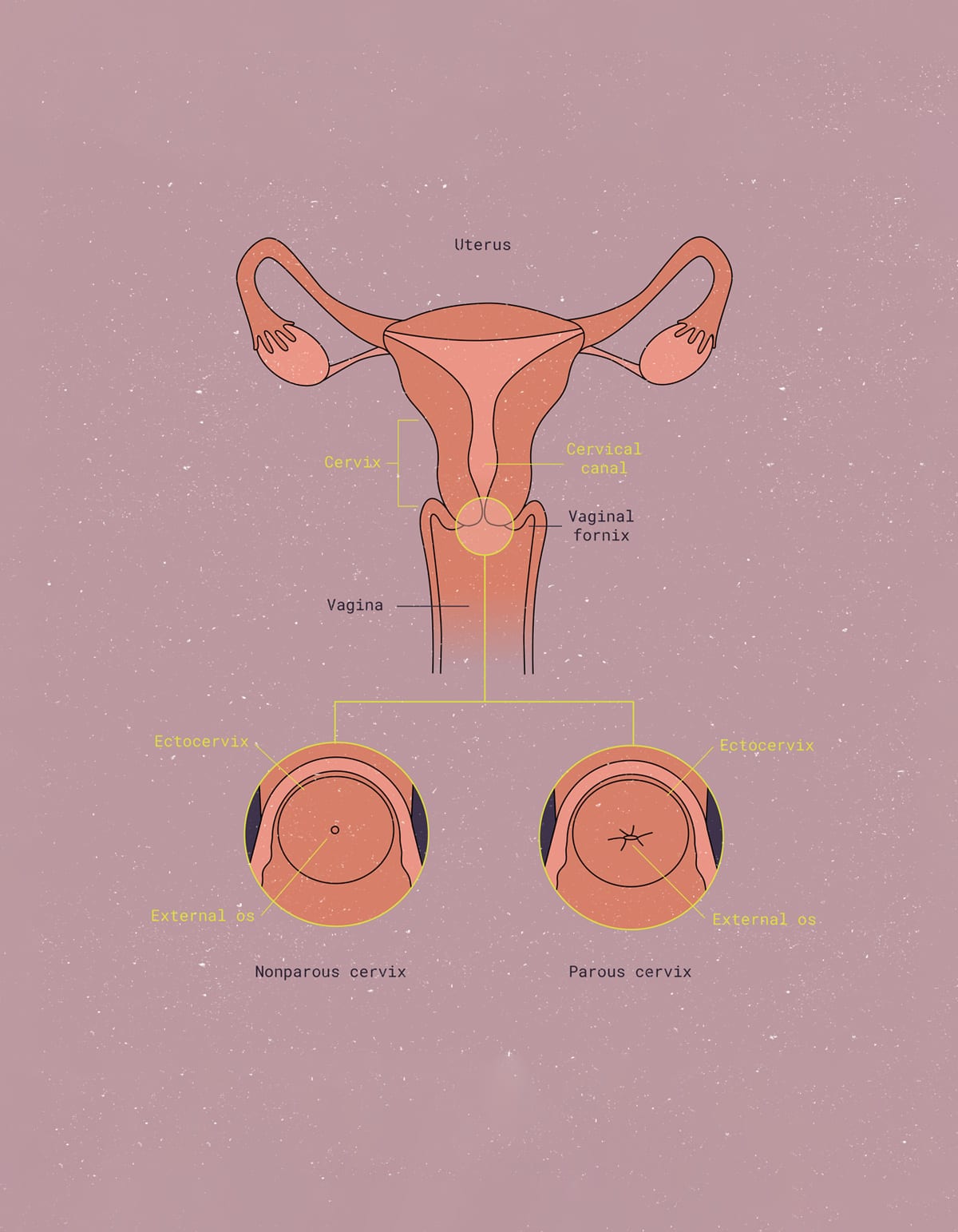Vaginal changes: How your vagina changes over time
What Happens to Your Vagina as You Age
Even with the abundance of youth-preserving beauty products in the world, some body parts will always tell the truth about our age. Just as our skin, limbs, and other body parts eventually succumb to gravity, the vagina undergoes its own unique aging process.
It’s totally normal to notice changes in your vagina’s shape, color, and size during various life stages: During puberty, pregnancy, after childbirth, during and after menopause – and just about anytime in between.
To learn more about how our vaginas change and how our vaginal health evolves as we get older, we spoke with Dr. Jane van Dis, a board-certified OB-GYN with over 13 years of experience.
Vaginal Changes During Puberty
The vagina’s first big change is at puberty. Estrogen courses through the bodies of girls and teens AFABAFAB stands for “assigned female at birth.” (assigned female at birth) around the ages of 10 – 15 and different parts of the vagina become enlarged as a result of these changes.
The labia become enlarged and may change color due to hormonal effects. It is at this time that the vagina fully matures and the ovulation cycle begins.1
Your Vagina During Adulthood, Before Childbirth
While the female physiology may be optimized for pregnancy and childbirth between the ages of 20 to 35, not everyone chooses to have children during this timeframe. During these years, pelvic floor (the muscles that support the bladder, bowel, and uterus) strength is at its peak.2
Visibly, the labia minora and majora — the inner and outer lips of the vagina — may grow larger and change in color.1 For many, this stage also marks the peak of sexual intimacy and activity.

With the onset of an active sex life comes the need for screening for sexually transmitted infections like chlamydia, gonorrhea and syphilis, as well as the initiation of pap smears (a screening test for cervical cancer).
It’s important to maintain a regular schedule with a primary care provider or OB-GYN during adulthood for an annual pelvic exam and pap smear every three years (more frequently if abnormal cells are found).
Does Your Vagina Change After Having Sex?
Your body will undergo some momentary changes both during and after sexual intercourse. But if you were once told that your vagina will get stretched out by penetrative intercourse or start to look “loose” after sex, well, that’s a straight-up myth.
Sex doesn’t impact your vagina’s strength, size, or flexibility, no matter how often you’re partaking. The only thing that could change your vagina is physical trauma to the area (yes, this includes vaginal birth).
The vulva and vagina will undergo other changes during sex: Your clitoris will become enlarged due to increased blood flow brought on by arousal, accompanied by possible changes in the shape of the clitoral hood. You may experience increased – or decreased – sensitivity in the vagina, vulva, and clitoris before or after orgasm. And, over time, your vaginal wall may actually become stronger with frequent intercourse.3
Vaginal Changes During Pregnancy & After Childbirth
Does your vagina change during pregnancy and after childbirth? Like much of the rest of your body, it does (and not necessarily in the ways you’d expect). Some of these changes will be temporary, while others may stick around for several months or even years. But don’t worry: Your vagina is extremely resilient!
Your Vagina During Pregnancy
It’s normal to notice that your vagina has changed colors – even to blue or purple – as blood flow increases in the region. This can happen as early as six weeks into pregnancy.4
You may also see varicose veins on the labia and the inside of your upper thighs (unfortunately, these so-called ‘spider veins’ don’t just target your legs). The combination of pregnancy hormones, increased pressure from an enlarged uterus, and increased blood flow all contribute to the possibility of formation of varicose veins during pregnancy. Thankfully, they usually go away on their own within a few weeks after giving birth.

During pregnancy, the pH of your vagina shifts, becoming more acidic. This can lead to slight changes in vaginal taste and odor — which are completely normal, and in most cases, nothing to worry about. Vaginal discharge may also increase in amount and thicken in consistency.
Keep in mind, however, that yeast infections are common during pregnancy. You’ll know you have one if you’re seeing lots of grayish-white or yellowish-white discharge along with serious itching. Thankfully, they’re easy to clear up with OTC remedies.
Your Vagina After Childbirth
Imagine your pelvis — the space between your hip bones, your sacrum, and your pubic symphysis — is a bowl, with muscles lining the bowl. During childbirth, these pelvic floor muscles stretch and tear.5
Some tears occur naturally; in rare cases, a doctor or midwifeA nurse midwife is a registered nurse who goes on to receive a master’s degree in nursing and specializes in midwifery. Midwives work with pregnant people before, during, and after childbirth, and may assist with or perform the delivery of a baby either at a birthing person's home, a birthing center, or at a hospital. might cut an episiotomy,6 a procedure where an incision is made starting at the vagina and going either sideways toward the vulva or down toward the anus (toward the perineum, the space between the vaginal and anal openings) to make delivery easier.
Individuals who experienced an episiotomy, where a physician creates an incision in the perineum to enlarge the vaginal opening, or suffered perineal tears, might need stitches after delivery.
Does your vagina change after birth?
The vaginal changes after birth and postpartum healing time varies for everyone, but some women report that their vagina feels looser and wider — which makes sense, seeing as you’ve just performed the miracle of childbirth and pushed a whole human being out of your vagina through the birth canal. Luckily, the vagina is made of elastic fibers and, in most cases, will eventually contract back to its original shape and size (or close to it) after childbirth.

During peak adulthood — around age 30 to 50 — the vagina will gradually lose some of its natural muscle definition. The pelvic floor muscles may also lose their strength due to childbirth and, well, gravity. Kegel exercises and other pelvic floor exercises can help prevent incontinence, improve circulation to your pelvic area, and strengthen the muscle tone of your pelvic floor.
Women who give birth later in their 30’s or 40’s may notice the vagina takes a bit longer to heal than it does for new mothers in their 20’s. Some sources say, however, that the 30- to 40-year-old range is when vagina-owners enjoy the perfect blend of hormone levels that facilitate better sex and intimacy.1
Vaginal Changes Before & During Menopause
Perimenopause
Perimenopause is the 5-to-10-year period before menopause starts. Hormonal changes take place. Estrogen levels begin to drop, causing imbalanced pH levels and vaginal dryness.
The change in pH can bring with it a few uncomfortable side effects: Namely, increased risk for yeast and bacterial vaginal infections.
Vaginal dryness may also impact sexual pleasure. Women may notice increased friction or abrasions with sex, potentially leading to painful sex, irritation and discomfort during the day.5
Thankfully, there are solutions to the not-so-pleasant vaginal lubrication difficulties of perimenopause. Doctors recommend using probiotic supplements and vaginal moisturizers to combat discomfort, as well as synthetic lubricants to help with sexual pleasure. Some vagina-havers also resource to vaginal estrogen to combat dryness, especially during intercourse.
Some health experts also recommend increasing sexual activity, whether alone or with a partner, to improve blood flow and pelvic floor strength.5
Menopause and vaginal changes
Menopause marks the end of our monthly menstrual cycles. The average age for menopause in the United States is 51,7 but it may start earlier for some. As previously mentioned, perimenopause makes its presence known through vaginal dryness, changes in timing or length of periods, and other physical changes. Other signs and symptoms of menopause may include:
- Hot flashes
- Chills
- Night sweats
- Sleep problems
- Mood changes
- Weight gain 8

During menopause, many vagina-owners experience vulvo-vaginal atrophy (VVA).8 Visibly, vulvovaginal atrophy causes the labia to become paler and smoother.1 The vulvar skin will appear thinner and more wrinkly and the mons pubis may begin to sag, as well. Pubic hair may start to gray or thin out — making grooming and down-there maintenance less of a chore.
Aside from the obvious changes mentioned above, the vagina goes through some less visible changes, too. The vaginal opening may become smaller and the length of the vaginal canal might shrink. At this stage, the body is preparing to close down the reproductive system so you can enjoy the freedom of a period-free life.
Even as Your Vagina Changes, Safe Sex Principles Remain the Same
It’s important to continue practicing safe sex as the vagina changes, especially if you have multiple partners. We asked Dr. Jane about the importance of safe sex at any age:
“The rules are the same,” she says. “Herpes and gonorrhea don’t care about your age, how many children or how many sex partners you’ve had. I’ve treated older women with STDs who are surprised that they were still vulnerable to STDs. The same guy that you wore a condom with at age 26 – ask him to wear one at 66.”
What are common vaginal changes that women experience during different stages of life?
Common vaginal changes include changes in lubrication, elasticity, and pH levels. During puberty, vaginal discharge increases; during menopause, vaginal dryness may occur. Pregnancy can lead to changes in vaginal tightness. It’s important to understand these changes for overall vaginal health and well-being.
How the vagina changes with age: Key Takeaways
It’s important to remember that there’s no such thing as a “normal” vagina. It will inevitably change in shape, size, and color as you get older – just like your face, hips, thighs, and breasts.
Of course, if you experience sudden vaginal changes, especially if it’s accompanied by any alarming or uncomfortable symptoms, talk to your healthcare provider or OB-GYN to rule out illness or infection.
The relationship with your vagina is one of the longest one you’ll ever experience. Make the most of it: Embrace your vagina for what it is and be thankful for the gifts it’s given you, whether birthing your children or providing you with a lifetime of sexual pleasure. We hope you’ll cherish and celebrate every milestone along the way.
This article is informational only and is not offered as medical advice, nor does it substitute for a consultation with your physician. If you have any gynecological/medical concerns or conditions, please consult your physician.
© 2025 The Flex Company. All Rights Reserved.
- Naftulin, J. (2018, November 27). How your vagina changes in your 20s, 30s, and beyond. Insider. Retrieved from insider.com/how-your-vagina-changes-2018-11[↩][↩][↩][↩]
- Taylor, E. (2019, March 8). How to Keep Your Vagina Healthy in Your 20s, 30s, 40s, and 50s. Healthline. Retrieved from healthline.com/health/womens-health/vagina-changes-20s-30s-40s-50s.[↩]
- Weiss, S. (2017, October 5). How Does Sex Affect Your Vagina? It’s Time To Debunk That “Loose” Myth. Bustle. Retrieved from bustle.com/p/how-does-sex-affect-your-vagina-its-time-to-debunk-that-loose-myth-2781279[↩]
- Pevzner, H. (2015, May 7). Crazy Things That Happen to Your Vagina During Pregnancy. Parents. Retrieved from parents.com/pregnancy/my-body/changing/pregnancy-vaginal-changes/[↩]
- Dunleavy, K. (2020, May 11). How Your Vagina Changes as You Age. FemmePharma Consumer Healthcare. Retrieved from femmepharma.com/menopause-blog/menopositivity-how-your-vagina-changes-as-you-age/[↩][↩][↩]
- Episiotomy: When it’s needed, when it’s not. (2020, August 25). Mayo Clinic. Retrieved from mayoclinic.org/healthy-lifestyle/labor-and-delivery/in-depth/episiotomy/art-20047282[↩]
- Menopause – Symptoms and causes. (2020, October 14). Mayo Clinic. Retrieved from mayoclinic.org/diseases-conditions/menopause/symptoms-causes/syc-20353397[↩]
- Sturt, K. (2015, April 29). 6 Ways Your Vagina Changes As You Age. HuffPost. Retrieved from huffpost.com/entry/ways-vagina-changes-as-you-age_n_7162742[↩][↩]







